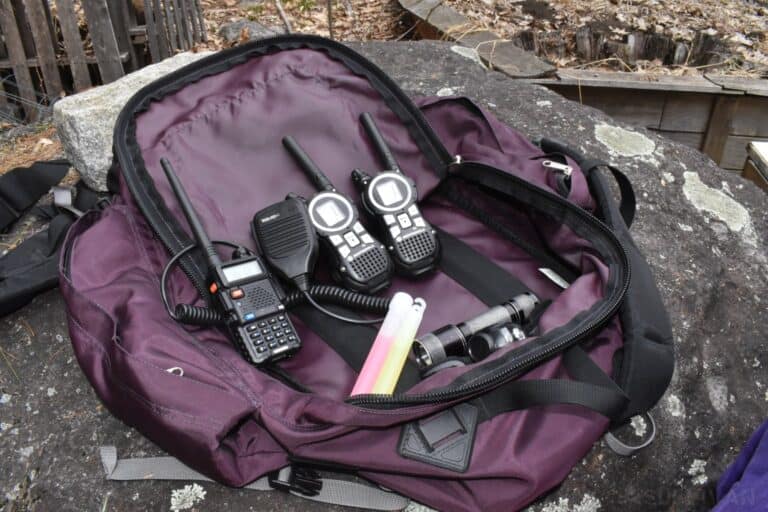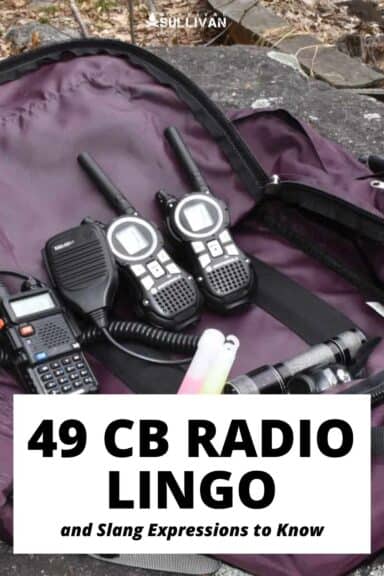Having a CB radio in your vehicle is a great way to keep in touch with other people in your group or other vehicles on the road, particularly truckers but also people like yourself who want to be a little bit more prepared. They are especially useful when cell phone signal is weak, or towers are out of action.

communication devices inside bug out bag: a Baofeng HAM radio, walkie-talkies, flashlight and two chemlights
But if you talk on a CB radio like you would on the phone, you’re going to clog up the channels. This will only ever piss people off, and you’ll miss important information from whoever you’re trying to communicate with.
To facilitate effective, crisp exchanges of information and also protect what is being said from outsiders, CB radio users have developed a long and colorful list of codes, slang terms and lingo.
Some of it’s just for fun, but much of it is useful as you’ll discover. Keep reading I’ll tell you about 49 of the most important terms to know.
Common 10 Codes
10 codes are short numeric codes that can convey questions, answers, status, orders and more.
They take a little more practice to memorize, but if you want to exchange sometimes complex concepts as quickly as possible using radio, they are indispensable, and commonly used by law enforcement.
10-1
Receiving poorly. This means that you aren’t receiving transmissions reliably or clearly. Lets the listener know the prior information might have gone missing.
10-3
Stop transmitting. A professional and brief way to tell someone that they need to be quiet or that their mic is potentially stuck on.
10-4
Okay, message received. Note that this just lets the other person know that you received their message. It is not necessarily a denial or acknowledgment, so make sure you let them know one way or the other.
10-6
Busy, and stand by. Used when you want to let someone know that you need a moment to deal with something before you pick the conversation back up. Often used when accessing need-to-know information.
10-7
Going off the air, or out of service. When you’re going to be away from the radio for a time or are shutting it down, use this code.
10-8
On the air or in service. Meaning that you or someone else you are referring to is able to receive radio calls.
10-10
Transmission complete, standing by. Sometimes shortened to just “10,” it lets hearers know that you are done transmitting and are standing by to receive a response.
10-13
Advise on conditions. Refers to weather, road conditions, and other factors.
10-16
Make pickup at. Used for giving instructions for pickup and transport.
10-18
Anything for us? A request for information, tasking, or work.
10-20
My location is, or ultimately what is your location. Often conveyed as “What’s Your 20?”
10-41
Please go to channel. Instructs listener to go to whatever channel is relayed after this code.
I made a full list of all the CB radio codes you might want to check out.
CB Slang
10 codes are great, but some of the most useful and certainly most entertaining CB radio lingo is in the form of slang.
The following represents a very, very small cross section, and hardly all of it, though you are bound to find these useful especially if you’re traveling by truck or some other vehicle.
Handle
Short for CB handle. This is a nickname akin to a screen name or username on the internet. Often describes something about the user. Generally, you get to choose your own, and this is encouraged because it helps cut down on confusion when talking to multiple users.
Driver
When using CB over the road, generically refers to anyone else unknown to you who is on the frequency.
Roger
Yes, or okay.
Come Back
Used to tell someone that you want to talk or that you didn’t hear their last transmission.
Come On
Used as a response to someone else who’s requesting to talk to you. E.g. “I hear you partner, come on.”
Copy
Also, copy that. The last transmission was heard and acknowledged.
Affirmative
Yes, or I agree.
Negatory
No, or I disagree. You can also use negative, but negatory is often preferred because it is phonetically different from affirmative and less likely to be confused when communications might be garbled or broken.
Break
A term used to tell other people on the channel to stop talking so that you can start talking. Should be used responsibly in times of emergency or when information is critical and needs to be relayed urgently.
Alligator
Refers to a tire or pieces of tires, specifically those from tractor trailers, that are laying in the road, but more generally reverse to any debris in the road that might cause damage to a vehicle that drives over it or hits it.
So named because it can “bite you” and damage your vehicle or cause injury and accident.
Boogie
To go fast or speed up.
Back it Down
Reducing speed, or a request to slow down.
Backed Out of It
When a vehicle cannot maintain its current speed and has to slow down or downshift.
Bear
Law enforcement. The cops. The fuzz. 5-0. Lice.
Plain Wrapper
An unmarked police or other law enforcement or security vehicle; a low-profile vehicle devoid of markings, livery, or insignia.
Jackpot
Refers to emergency vehicle lights on and flashing. The lights themselves are typically referred to as a gumball machine, specifically when on a police cruiser.
Checkpoint Charlie
A checkpoint where inspections, interviews or other certain law enforcement contact will occur. Often refers to DUI checkpoints, but can be used for any others.
Greasy
Slick or slippery. Often refers to snow and ice, not just chemical contaminants.
Ho Chi Minh Trail
Infamously refers to California’s Highway 152 which is notorious for an extreme number of automobile accidents, but more generally refers to any road which is currently clogged with accidents or known to cause them.
Black Eye
A headlight is out. Can be used to refer to the status of your vehicle or another vehicle.
Brush Your Teeth and Comb Your Hair
Surreptitiously lets people listening know that law enforcement are out scanning for speeders with radar guns or stations, or potentially looking for a vehicle in the convoy. i.e., look your best and act right, don’t draw attention.
Bumper Sticker
A vehicle that is tailgating or following way too closely.
Donkey
Behind you, or more generally to the rear. For instance, “Me and Billy are on your donkey.” “I got a bogey on my donkey.”
Radio
When using a CB radio, the term radio always refers to the CB.
FM
When communicating on a CB radio, FM, short for “AM/FM,” always refers to an AM/FM radio set.
Front Door
In front of, or the front of a vehicle.
Back Door
Something behind you. For example, such and such a vehicle is at your back door, a pursuer is at your back door.
Go to Company
Tells the listener to go to a designated channel to continue the conversation. Often used when a channel needs to be vacated for whatever reason.
Go Your Ears On?
A general request asking if nobody in particular or a specific person is listening to their CB.
Shutter Trouble
Having trouble staying awake.
Got My Nightgown On
Getting ready to go to sleep.
Ratchet / Ratchet Jaw
To continuously talk on a channel, preventing other people from transmitting or getting a word in edgewise. A ratchet jaw is a radio user who does this frequently or is notorious for it.
Reading the Mail
To listen to CB conversations without talking or communicating.
Sandbagging
The same as reading the mail; to listen to CB conversations without chiming in.
Short Short
Meaning a small or short amount of time. Time sensitive.
TYA
Tune Your Antenna. Can be used as a status notification that your radio transmissions are bad or failing, or that you have a weak signal. Also used to instruct other senders to check their set for functionality and reception.
Bambi
Refers to any deer, living or dead.
Road Pizza / Pizza
A road-killed animal of any kind on or near the road, or a pedestrian struck by a vehicle.

The post 49 CB Radio Lingo and Slang Expressions to Know appeared first on Survival Sullivan.
https://www.survivalsullivan.com/cb-radio-lingo-and-slang/
 CampingSurvivalistHuntingFishingExploringHikingPrivacy PolicyTerms And Conditions
CampingSurvivalistHuntingFishingExploringHikingPrivacy PolicyTerms And Conditions
